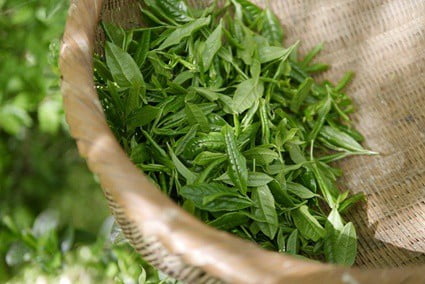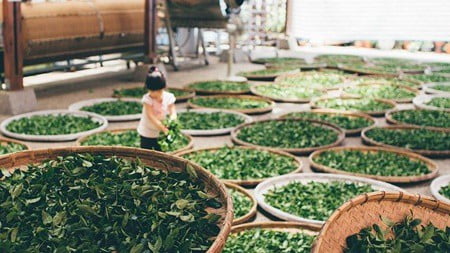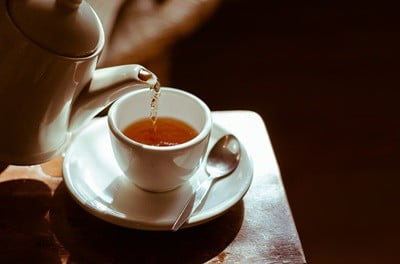Not all teas are rabbit-safe. Although rabbits are herbivores, there are many plants, herbs, and flowers that can be poisonous if consumed.
Rabbits can drink some herbal teas, including those made from peppermint, chamomile, lavender, oregano, and rosemary. Rabbits eat these herbs in the wild and in captivity, and can benefit from drinking herbal tea on occasion.
These benefits include assisting with joint pain, soothing anxiety and stress, and resolving digestive issues. Tea is also useful for encouraging rabbits to drink more liquids. Avoid giving black and green tea to a rabbit as it’s very high in caffeine.
While there are many health benefits to giving your rabbit tea, there are precautions that must be taken. Tea should always be offered cooled and never hot, and tea must be served without sweeteners and milk. Rabbits are lactose intolerant and unable to easily process large amounts of sugar.
Is Tea Safe for Rabbits?
The majority of teas are made from various plants, flowers, and herbs. Spices derived from plant parts are also occasionally included in the mix, such as chai tea blends. In spite of rabbits being strict herbivores, there are many plants that rabbits cannot safely eat, or drink tea made from.
The large majority of teas that are unsafe for rabbits won’t do much harm, if only a small amount is ingested. Other teas are OK for rabbits to drink, and many actually have genuine health benefits.
Note that rabbits cannot vomit. Should a rabbit ingest something it shouldn’t, including tea, the rabbit has no choice but to allow the substance to pass through its system. This can do all sorts of damage. Sadly, it is also the reason why some rabbits pass before their time.
Rabbits And Caffeine
Not all teas contain caffeine, which is really important because caffeine is dangerous to rabbits. Caffeine is a methylxanthine.
Science posits that plants, like the coffee plant, use caffeine as a natural pesticide. Rabbits are equally repelled by caffeine. Eating food or drinking tea that contains caffeine may be lethal. Caffeine causes:
- Diarrhea
- Excessive thirst
- Urination
- Tremors
- Abnormal heart rate
- Seizures
Rabbits can develop a caffeine addiction as it is an addictive substance. Free Radical Biology and Medicine found that rabbits given doses of caffeine experienced changes to their nervous system.
Can Rabbits Have Chamomile Tea?
Chamomile tea is safe for rabbits to drink, as well as being good for soothing anxiety, nervousness, and stomach issues. Nervous rabbits may benefit from having chamomile tea, depending on the cause of the anxiety.
Rabbits are naturally flighty animals. All manner of things can cause a bout of nerves, like storms, travel, strangers in the home, or loud noises outside. Obviously, if you know that something, like a thunderstorm or roadwork, is on the way, prepare the tea beforehand.
Give your rabbit a handful of hay or pellets to encourage it to eat, then offer it some cooled chamomile tea. This will help calm its nerves.
Giving it some tea when it is already showing signs of stress is also beneficial. A rabbit with dietary issues or is showing signs of nausea will benefit from drinking chamomile tea.
Chamomile has additional uses, making it essential to keep on hand. Dried chamomile can be sprinkled through your rabbit’s food as a part of its regular diet. This plant also has antibacterial and antiseptic properties. A cold chamomile tea compress is great for sore hocks and weepy eyes too.
Can Rabbits Have Green Tea?
Green tea is made from the leaves of the Camellia Sinensis plant. It contains far less caffeine than coffee or regular black tea, but it is still not advised to offer any to a rabbit.

Can Rabbits Have Black Tea?
Black tea is made from the same plant as green tea. The leaves are dried and oxidized, giving a completely different flavor. Can this version of the Camellia Sinensis leaf be made into a safe tea for rabbits to drink?
Black tea contains slightly more caffeine than green tea. As such, it is not recommended for rabbits. While this tea still contains far less caffeine than a normal cup of coffee, it still isn’t the best idea to offer your rabbit any.
Can Rabbits Have Rooibos Tea?
Rooibos tea is a caffeine-free alternative to green tea and black tea, and is packed with a delicious flavor.
Rooibos is full of antioxidants like aspalathin and nothofagin. These fight free radicals in the body and protect the heart.
Rooibos is a part of the Fabaceae family, which includes peas, legumes, and beans. All of which can cause gastrointestinal issues in rabbits. Rooibos tea appears to be safe for rabbits to drink if offered infrequently, but it’s not recommended.
Can Rabbits Have Lavender Tea?
Lavender, flower, or tea, is good for soothing anxious rabbits as the flowers are mildly anti-stimulating. Meaning it is a very mild sedative that eases blood pressure. Stressed rabbits, or those about to undergo a stressful situation (like travel), will benefit from lavender tea. This tea has many other beneficial properties, including being:
- Antimicrobial
- Antiparasitic (depending on the type of lavender)
- Stimulating circulation
- Pain relieving
Breeders might also use lavender to help a late-term rabbit doe deliver her litter. Lavender tea is good for the uterus, heart, liver, and kidneys, as well helping with stomach bloat.
Can Rabbits Have Peppermint Tea?
Peppermint plants and peppermint teas are safe for rabbits. Owners will make up a small batch of peppermint tea for their rabbit if it is dehydrated or refusing to drink plain water.
Peppermint tea is handy if your rabbit is fussy about water, or if it has trouble dealing with hot weather. Ensure that the tea has no additives.
Can Rabbits Have Herbal Tea?
Herbal tea, depending on the herbs involved, can be good for a rabbit. Grass hays comprise the bulk of a rabbit’s diet in the wild, as noted by the Journal of Zoology. It will also happily munch on herbs it comes across. However, not all herbs are safe for rabbits, and some are even toxic.
The best way to ensure that the herbal tea contains only rabbit-safe herbs is to either make it yourself or check the list of ingredients.
Can Rabbits Have Oregano Tea?
Oregano is a member of the mint family. It is anti-inflammatory and good for boosting energy levels. Thankfully, oregano tea is also safe for rabbits.
Oregano is full of flavonoid and phenolic compounds. These are useful for decreasing inflammation in the body. As rabbits have sensitive stomachs and intestines, these anti-inflammatory properties can be useful when the rabbit has some sort of internal upset causing inflammation. Older rabbits with arthritis or muscle pain may benefit from drinking oregano tea.
Can Rabbits Have Rosemary Tea?
Rosemary makes any roast vegetable platter delicious. The leaves and stems, once steeped, are useful for encouraging healthy circulation and stimulating the digestive tract.
Rosemary tea can be good for helping rabbits recover from exhaustion or weakness. It’s suggested that rosemary tea is also good for rabbits during colder weather.
Can Rabbits Have Lemon Balm Tea?
Lemon balm tea is useful for treating a variety of issues, including sleeping issues and muscle spasms. It can be hard to diagnose a rabbit with insomnia, but if you notice that it is active and restless at night, lemon balm tea can be beneficial.
Lemon balm tea is good for relaxing muscles and helping a rabbit with gas. This tea encourages muscles to relax and allow the gasses to pass through the rabbit’s system, alleviating bloat. This is particularly useful when you are introducing new foods into your rabbit’s diet.
Can Rabbits Drink Tea With Milk?
A rabbit doesn’t need milk once it has been weaned. Still, some owners enjoy offering their rabbits a treat every now and then. The thing is, rabbits are lactose intolerant. Cows’ milk will upset a rabbit’s sensitive stomach. To a point where it suffers digestive or gastrointestinal distress.
The fact that rabbits are lactose intolerant can seem a bit odd. A rabbit kit survives its first few weeks of life by drinking its mother’s milk, after all. As do many mammals.
The American Journal of Human Genetics explains that this is due to newborn mammals, including rabbit kits, having high levels of lactase in their intestines. Lactase is what breaks down the sugar in milk, making it more easily digestible. As a rabbit grows and weans off of its mother’s milk, lactase levels drop drastically.
Don’t fret if your rabbit snuck a drink from your tea cup. A small amount of tea with milk likely won’t do much harm.
Goat milk and rabbit milk formulas are safe milk and milk alternatives that can be given to rabbits. These don’t necessarily milk that you would, or should, put in your tea, though. Formulas are strictly for animals only.
Can Rabbits Eat Tea Leaves?
If the tea is safe for the rabbit to drink, the leaves, herbs, or plant parts used to make the tea are safe for the rabbit to eat as well. Fresh tea, meaning tea that hasn’t been through a drying process, is more ideal to include in a rabbit’s diet. Fresh greens and herbs are the best things for a rabbit.
Tea leaves that have been used to make a batch of tea can be fed to a rabbit if you don’t want them to go to waste. Preferably, your rabbit will eat these leaves immediately, as the liquid and organic matter is a perfect culture for bacteria and mold to grow. If your rabbit doesn’t eat these leaves within 30 minutes, dispose of them.

Rabbits and Tea Sweeteners
Sugars can quickly cause a chemical imbalance in the rabbit. Some sugars, too, are toxic to rabbits, and must be avoided at all costs. Avoid putting sweeteners in tea that you are preparing for your rabbit.
Xylitol is a low-calorie sugar substitute derived from plants, and stevia is a no-sugar sweetener taken from the stevia plant. Both are considered healthier, or low-calorie, alternatives to normal sugar
Xylitol is toxic to rabbits and will cause seizures and liver failure. As for stevia, the stevia plant is considered non-toxic. As the stevia product isn’t true sugar, it may not upset the delicate pH and bacteria colony balance in the rabbit’s gut. We cannot say for certain if stevia is safe for rabbits.
Normal sugars and honey aren’t much better either. Rabbits cannot process the sugars in honey and sugar products, be they raw or refined. Beyond causing upset in the gut, this excess of sugar can cause cecal dysbiosis and enteritis. These disorders, and others like them, cause a whole host of problems and discomfort.
Broadly, a diet with too much sugar will cause rabbits to gain weight and become obese. If you wish to give your rabbit tea, it must be unsweetened.
Do Rabbits Like Tea?
Every rabbit is different. What one likes outside of its regular food is entirely up to the individual. One rabbit may love lapping up peppermint tea, but another may detest it.
Health Benefits of Tea for Rabbits
Offering cooled tea can encourage a rabbit to drink more. Many types of tea also provide a variety of health benefits. Lavender and chamomile teas are great for soothing a stressed or anxious rabbit. Oregano and lemon balm teas are excellent for helping with issues with the digestive tract.
Just as there are teas safe for rabbits to drink, there are teas that are unsafe for rabbits to drink. This includes black tea and green tea, two of the more common types of tea kept in U.S. households, which contain caffeine.
Tea should be cooled completely before being offered to a rabbit, and it should not be left to sit in the hutch overnight. Tea leaves should either be offered fresh from the garden, or once they have cooled post-steep. These should be disposed of if not eaten within 30 minutes.


I have rabbits that suffer from what the Germans call Schnuffels. They inherited a weakness from a mutated gene that their mother had without my knowing it, until after I bred her. I have one left. I have been unable to get the immunizations for it for years here in Germany. It’s an infection of the sinuses, but also of the tooth-roots. It spreads through their head over the years. I just lost one because the infection began pressing on his brain. I was thinking I might be able to give the one I have left Thyme tea, no sugar or anything else – homemade, but I was unable to determine whether or not this is generally okay. If anyone knows, that would be great. Thanks!!